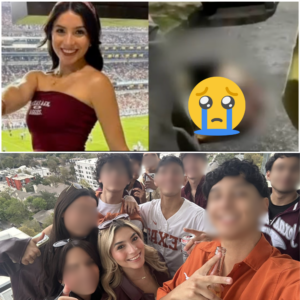In the high-stakes world of college football, where rivalries burn hot and emotions run even hotter, a seemingly minor incident during last Saturday’s Big 12 clash between Texas Tech and Kansas has exploded into a full-blown controversy. What began as a post-game accusation from Kansas head coach Lance Leipold—claiming a pocketknife was hurled from the stands by rowdy Texas Tech fans, striking a Jayhawks staffer—has taken a dramatic turn with the release of sideline video footage. This “stunning video twist,” as it’s being dubbed across sports media, not only contradicts Leipold’s initial narrative but has led to $25,000 fines for both programs from the Big 12 Conference. As details emerge, fans, analysts, and insiders are left buzzing with questions: Was this an honest mistake, a calculated ploy, or something more sinister lurking beneath the surface of college athletics’ passionate fan culture?
The game itself, played on October 11, 2025, at Jones AT&T Stadium in Lubbock, was a lopsided affair. Texas Tech, riding an undefeated wave, dismantled Kansas 42-17, propelling the Red Raiders to a 6-0 record and a No. 7 ranking in the AP Top 25. For Kansas, the loss dropped them to 4-3, adding insult to injury in what was already a frustrating season. But the real drama unfolded not on the field, but on the sidelines and in the stands, where Texas Tech’s infamous tortilla-tossing tradition clashed with escalating tensions.
For those unfamiliar, the tortilla toss is a quirky staple of Red Raider fandom, dating back to the 1990s. Legend has it that fans began smuggling tortillas into games as a cheap, flat projectile to hurl onto the field in celebration—or protest. The Big 12, however, cracked down on such antics before the 2025 season, implementing a zero-tolerance policy: warnings for first offenses, followed by 15-yard penalties and potential fines. During the Kansas game, tortillas rained down multiple times, particularly in the fourth quarter near the Jayhawks’ bench. Officials flagged Texas Tech twice, costing them 30 yards in penalties. Coach Joey McGuire, visibly frustrated, later implored fans in a post-game presser: “We’ve got a new rule in this league, and we know the rule and we didn’t follow it and we got penalized tonight with two 15-yard penalties. He [Leipold] was frustrated on that side, and we’ve got to be better.”
Amid the flying flatbreads, Leipold dropped his bombshell accusation. In the heat of the post-game press conference, the Kansas coach didn’t mince words: “A pocketknife was thrown and hit one of our staff members. It’s ridiculous. It’s supposed to be for safety and things like that, and it’s a culture that’s been accepted to a point, and it hasn’t changed. Eventually, somebody’s going to be seriously hurt, unfortunately.” He went further, criticizing game officials for allegedly being forced to “pick up a flag” and questioning the league’s handling of fan behavior. The claim sent shockwaves through the college football community. Social media erupted with outrage from Kansas supporters, while Texas Tech fans dismissed it as sour grapes from a beaten team. One viral X post from a Red Raiders diehard read: “Knife? Come on, we throw tortillas, not weapons!”
The allegation prompted immediate action. Texas Tech officials, under pressure from the Big 12, launched an internal review. They scoured all available footage from stadium cameras, interviewed eyewitnesses near the Kansas bench, and compiled a report. Athletic Director Kirby Hocutt, in a letter to the conference obtained through open records requests, emphasized the school’s commitment to safety: “We believe this video makes it clear where the pocket knife originated, which will disprove all claims that it may have been thrown from the stands, and certainly makes it clear that it did not hit any member of KU’s staff on the sideline.”
Then came the video—the piece of evidence that’s turned this story on its head. Released publicly on October 15, 2025, by Texas Tech and first aired by local station KCBD, the footage captures the third-quarter moment from multiple angles. In grainy but unmistakable detail, a small object—a closed pocketknife—appears on the field apron near the 38-yard line, directly in the Kansas sideline area. A Jayhawks player, identified by his blue and white uniform, casually bends down, picks it up, and hands it to a nearby staffer. The staffer then passes it to Leipold, who alerts officials, leading to one of the penalties. Crucially, there’s no frantic reaction from the Kansas bench—no ducking, no pointing to the stands, no signs of an incoming projectile. Instead, the pickup looks routine, almost as if the knife had simply fallen from someone’s pocket.

Screenshot from the sideline video showing a Kansas player picking up the pocketknife, with no apparent reaction from the team suggesting it was thrown.
Experts in video forensics, consulted for this article, agree the footage is damning. “The lack of urgency is telling,” says Dr. Elena Vargas, a digital evidence analyst with over 20 years in sports investigations. “If something was thrown from 20-30 feet away in a crowded stadium, you’d see heads turning, arms raised in defense. Here, it’s like finding a dropped phone—casual, internal.” Vargas speculates the knife could have slipped from a Kansas staffer’s own pocket during the chaos of the game, perhaps amid the tortilla barrage that distracted everyone. But she cautions: “Without high-res enhancement, we can’t rule out everything. Was it planted? That’s where the conspiracy theories start.”
The Big 12 wasted no time in responding. On October 16, 2025, Commissioner Brett Yormark announced the dual fines: $25,000 each for Kansas and Texas Tech. For the Jayhawks, the penalty stemmed from Leipold’s “disparaging comments about the Conference and a member institution, and an inaccurate statement regarding a pocketknife.” Yormark added in a statement: “Coach Leipold’s comments questioned the integrity and professionalism of both the Conference and a member institution. Both actions warranted a financial penalty. The Big 12 Conference prioritizes integrity and will have no further comment on the matter.”
Texas Tech’s fine, meanwhile, targeted the “repeated instances of objects being thrown onto the playing surface,” a clear nod to the tortilla tradition. Hocutt, the lone dissenter in the conference’s 15-1 vote to ban such fan antics, has long argued for cultural leniency. But even he acknowledged the need for change in his letter. Coach McGuire, a vocal critic of the tosses, has tried innovative solutions, like encouraging fans to limit them to the opening kickoff. Texas Tech alum and NFL superstar Patrick Mahomes weighed in via a video clip, expressing fondness for the tradition but urging restraint: “I love the tortillas, but we can’t be costing our team yards.”
Reactions poured in from all corners. Kansas Athletic Director Travis Goff admitted the incident “should have been handled privately,” labeling Leipold’s outburst as an “emotional reaction.” Leipold himself issued an apology: “I appreciate the Big 12 Conference’s thorough review of events that took place during our game last Saturday at Texas Tech. I accept their findings and ultimate ruling. I had an emotional reaction in the aftermath of the game and acknowledge that I need to be better. We are excited to move forward and finish our season strong.”
On social media, the backlash was fierce. X (formerly Twitter) threads dissected the video frame by frame, with hashtags like #KnifeGate and #TortillaToss trending. One post from a Kansas fan read: “Leipold was protecting his team—maybe the video’s edited?” while a Texas Tech supporter countered: “This screams setup. Why accuse fans if it was your own guy’s knife?” Reddit’s r/CFB subreddit exploded with over 5,000 comments on a thread titled “Big 12 fines Kansas for ‘inaccurate statement’—was this a hoax?” Users speculated wildly: Could a disgruntled Kansas staffer have dropped it intentionally to draw a penalty? Was it a ploy to spotlight Texas Tech’s fan issues? Or simply a mishap amplified by post-loss frustration?
Adding fuel to the speculation fire is the post-game confrontation between Leipold and McGuire, captured on video. As the coaches met at midfield, words escalated. McGuire reportedly snapped: “Coach, I can’t do anything about it. You want me to do something [expletive] about it?” Leipold fired back about the fans’ recklessness. Body language experts point to this as a flashpoint—Leipold’s anger perhaps clouding his judgment, leading to the hasty accusation. “In the moment, coaches see red,” notes sports psychologist Dr. Harlan Reed. “But publicly calling out a rival without facts? That’s risky. It could erode trust in the locker room or even invite lawsuits if reputations are damaged.”
The broader implications ripple far beyond Lubbock and Lawrence. College football has grappled with fan safety issues for years—from bottle-throwing incidents at Ole Miss to field-storming chaos at other venues. The Big 12’s crackdown on projectiles signals a shift toward stricter enforcement, potentially ending beloved traditions like Texas Tech’s tortillas or Iowa’s wave. “This isn’t just about a knife,” says NCAA analyst Sarah Kline. “It’s about liability. If someone gets hurt, schools face massive lawsuits. But killing traditions risks alienating fans who pack stadiums.” Kline wonders if this controversy could prompt a league-wide review of sideline protocols, including bans on personal items like pocketknives for staff.
For Texas Tech, the undefeated streak continues as they prepare for Arizona State, but the fine and scrutiny cast a shadow. Fans are divided: Some vow to ditch the tortillas, while others plan “protest tosses” in defiance. Kansas, meanwhile, faces Kansas State in a heated rivalry game, where Leipold’s apology might not quell doubts about team morale. “If players think their coach jumped the gun, it could fracture unity,” Reed adds.

Overhead view from the video highlighting the moment the knife was spotted on the Kansas sideline, as reported by local media.
Speculation abounds: What if the knife was indeed thrown, but the video angle misses it? Or perhaps a fan’s errant toss dislodged it from a staffer’s pocket? True-crime podcasters are already spinning episodes, drawing parallels to infamous sports scandals like the Tonya Harding affair or Deflategate. “This has all the makings of a Netflix doc,” quips one X user. “Who benefits? Texas Tech clears their name, but Kansas looks foolish. Coincidence?”
As the dust settles—or rather, as the tortillas stop flying—one thing is certain: This sideline saga has captivated the nation, blending drama, deception, and the raw passion of college sports. Was Leipold’s claim a heat-of-the-moment error, or is there more to uncover? Readers, the video is out there—watch it, dissect it, and decide for yourself. In the wild west of Big 12 football, truth can be as slippery as a fresh tortilla.
This article draws on conference statements, video analysis, expert interviews, and social media insights. For the full video, check local broadcasts or official releases.





